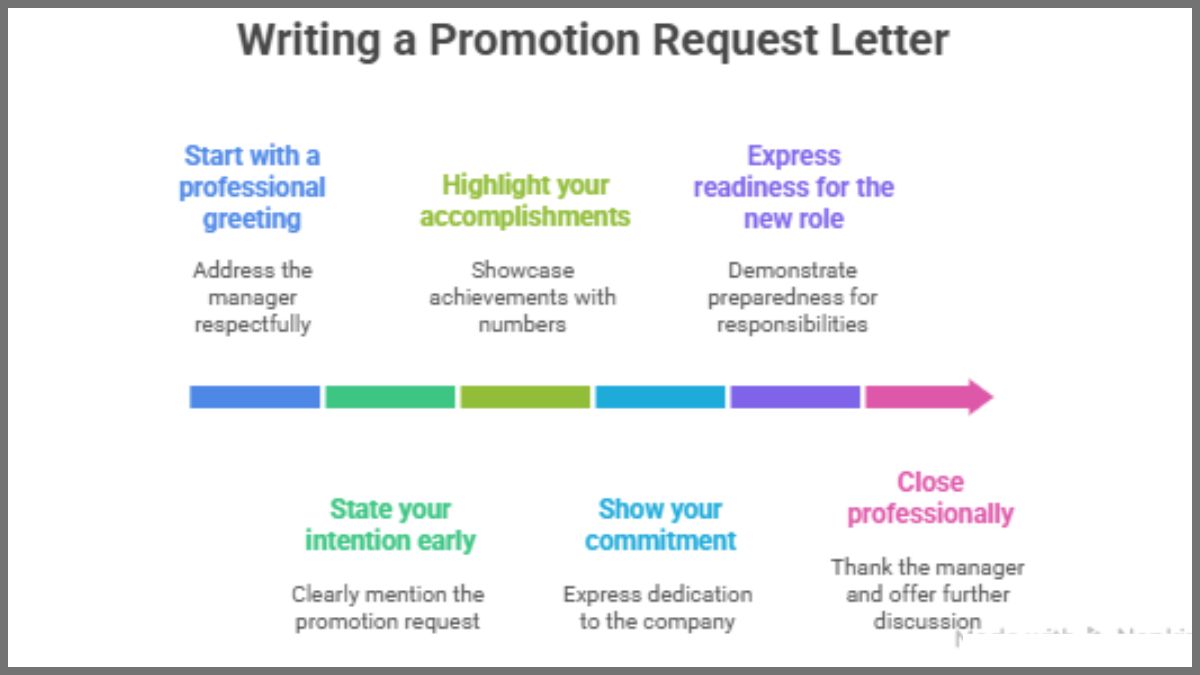Feeling like you’re ready to move up in your company? You’re not alone. Many people work hard, gain experience, and develop new skills hoping to climb the career ladder. But here’s the thing—hoping isn’t always enough. Sometimes, you need to ask for a promotion directly, and the best way to do that professionally is by writing a promotion request letter.
If you’ve never written one before, don’t worry. In this blog post, we’ll walk through how to create a strong, clear, and confident letter that increases your chances of getting the promotion you deserve—all in simple, conversational language.
Why Write a Promotion Request Letter?
You may be wondering, “Isn’t a conversation enough?” While face-to-face chats are great for discussing career goals, a written letter serves as a formal record of your request. It also gives your manager time to review your accomplishments and think about your next step. Think of it this way: just as startups use an interactive pitch deck tool to present their case clearly and persuasively to investors, a well-written promotion request letter helps you present your value in a structured, compelling way.
Plus, a well-written formal letter like a promotion request:
- Shows your professionalism
- Highlights your contributions and achievements
- Reinforces your interest in growing with the company
- Provides a clear case for why you’re ready.
How to Write a Promotion Request Letter
The goal is to be confident but respectful. Highlight your achievements without sounding boastful. Let’s break it down into a few key sections:
1. Start with a professional greeting
Address your letter to your immediate manager or supervisor, preferably using their full name (e.g., “Dear Mr. Sharma” or “Dear Ms. Iyer”). This sets a respectful tone from the start.
2. State your intention early
Get straight to the point. Mention that you’re writing to formally request a promotion to a specific position. Don’t make your manager guess your purpose.
Example: I’m writing to express my interest in the Senior Marketing Executive role and to formally request a promotion from my current position as Marketing Associate.
3. Highlight your accomplishments
This is your chance to shine. Think of it as your career pitch. Mention specific achievements, projects you’ve led, problems you’ve solved, or targets you’ve exceeded. Use numbers wherever possible—they grab attention and show the impact you’ve made.
Example: Over the past year, I’ve successfully led three marketing campaigns that resulted in a 40% increase in customer engagement. Additionally, I trained two new team members and introduced a new reporting system that improved productivity by 20%.
4. Show your commitment
Explain why you love working at the company and how invested you are in its success. This demonstrates long-term dedication, which managers really appreciate.
Example: I truly enjoy working with this team and believe in our mission. I’m excited by the direction we’re heading and would love to grow along with the company.
5. Express your readiness for the new role
Reassure your manager that you’re prepared and able to take on the new responsibilities. You can even mention any training or development courses you’ve completed—or plan to undertake—to prove you’re serious about your growth.
Example: I’ve studied the responsibilities of the senior role and feel confident that my skill set and experience align with the expectations. I’ve also completed the Advanced Leadership workshop last quarter to prepare myself for team management opportunities.
6. Close professionally
Wrap up by thanking your manager for considering your request. Let them know you’re open to further discussion and would be happy to discuss your next steps in person.
Example: Thank you for considering my request. I’d appreciate the opportunity to further discuss how I can contribute in a higher capacity. Please let me know a convenient time to meet.
Sample Promotion Request Letter
Still unsure how it all comes together? Here are some sample letters for inspiration:
Sample 1: For Senior Analyst Role
Subject: Promotion Request for Senior Analyst Role
Dear Mr. Kapoor,
I hope this message finds you well. I’m writing to formally request a promotion to the position of Senior Analyst within our department.
Over the past two years, I’ve taken on increasingly complex projects and achieved measurable results. For instance, I was able to streamline the data reporting process, reducing turnaround time by 30%, and led a cross-functional team that delivered a critical client report ahead of deadline. I’ve also mentored new team members and contributed to onboarding training materials.
I truly enjoy being part of this organization and feel that I’m ready to take on greater responsibilities. I’ve been proactive in preparing for the next step by completing analytics certification courses and expanding my skill set in data visualization tools.
Thank you for considering my request. I’d be happy to discuss this further at your earliest convenience.
Sincerely,
Anjali Verma
Sample 2: For Assistant Manager Position
Subject: Request for Consideration for Assistant Manager Position
Dear Mr. Singh,
I hope you are well. I am writing to formally request consideration for promotion to the Assistant Manager role within our operations team.
During my four years with the company, I have consistently met performance targets and contributed to key process improvements. Most recently, I led an initiative to optimize workflow procedures, which resulted in a 25% increase in team efficiency and significant cost savings. Additionally, I have taken the lead on mentoring new hires and coordinating training sessions to support their development.
I am confident that my experience and dedication have prepared me for this next step. I am committed to contributing at a higher level and further supporting the goals of our department.
Thank you very much for your time and consideration. I look forward to the opportunity to discuss this further.
Best regards,
Rohit Mehra
Sample 3: For Manager Position
Subject: Promotion Request for Manager Position
Dear [Manager’s Name],
I hope you are doing well. I am writing to formally request a promotion to a Manager position within [Company Name].
Over the past [number] years at [Company Name], I have consistently taken on greater responsibilities and delivered impactful results. I’ve been actively involved in leading projects, improving team collaboration, and streamlining operational processes to support departmental goals. Additionally, I’ve contributed to onboarding and mentoring new team members, helping them transition smoothly and perform effectively.
In preparation for this next step, I’ve completed relevant training programs and have taken initiative in team coordination, conflict resolution, and strategic planning tasks. I believe these experiences have positioned me well for a managerial role and have strengthened my ability to lead a team successfully.
Thank you for considering my request. I would appreciate the opportunity to further discuss how I can contribute in a managerial capacity and support [Company Name]’s continued growth and success.
Sincerely,
[Your Full Name]
When’s the Right Time to Ask for a Promotion?
Timing is everything. Asking too soon might come off as over-eager, while missing the right moment can mean lost opportunities. So how do you know it’s time?
Here are a few signs:
- You consistently exceed expectations in your current role
- You’ve taken on additional responsibilities outside your job description
- You’ve received positive feedback from peers and managers
- You’ve been in your position for a reasonable amount of time (usually 1-2 years or more)
- A suitable higher-level opportunity has opened up in your team or company
If you want to learn more about how to professionally request meetings with your manager or supervisor before making such requests, check out our post on how to write a professional meeting request email.
Tips to Make Your Promotion Request Letter Stand Out
- Keep it concise. Respect your manager’s time. Stick to one page.
- Use clear, simple language. There’s no need for fancy vocabulary. Clarity wins.
- Be honest and confident. Don’t downplay your achievements.
- Customize for the role you’re targeting. Tailor your letter for the specific position and expectations.
- Proofread carefully. A polished, error-free letter reflects your professionalism.
Conclusion
Writing a promotion request letter may feel intimidating, but it doesn’t have to be. Treat it as an opportunity to showcase your hard work, your growth, and your goals. Just like building your career, this process takes planning, confidence, and communication.
If you believe you’ve earned the next step in your career, go ahead—put it in writing. The right words might just get you the promotion you deserve.
So, are you ready to take your career to the next level?





